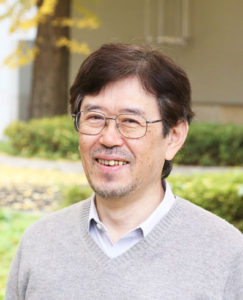[wc_row][wc_column size=”two-third” position=”first”]
柴田 宏
准教授
[/wc_column][wc_column size=”one-third” position=”last”]

[/wc_column][/wc_row]
[wc_row][wc_column size=”one-half” position=”first”]
| hshibata[at]gunma-u.ac.jp | |
| Tel | 027-220-8835 |
Hiroshi Shibata earned his MD from University of Tokyo in 1980 and his PhD in Medicine from Gunma University in 1992. From 1982-1987, he was a fellow in Medicine at University of Tokyo. From 1987-1991, he was a research associate in the laboratory of Dr. Tetsuro Kono in the Department of Molecular Physiology and Biophysics at Vanderbilt University, where he began his studies on the insulin action. During this period, he discovered the putative insulin-regulated protein kinase that phosphorylates and activates PDE3B (insulin-sensitive cAMP phosphodiesterase).
In 1991, he joined the laboratory of Dr. Itaru Kojima at Gunma University, where he has been engaged in the mechanism of insulin regulation of GLUT4 traffic in adipocytes. He is currently focused on the switching mechanism of GLUT4 sorting from ‘recycling’ to ‘degradation’, which is regulated by insulin-stimulated hydrogen peroxide production.
From 2011, He extended his research interest to the non-gustatory role of sweet taste receptor and discovered the expression of homomeric T1R3 sweet-sensing receptor in adipocytes, which negatively regulates adipogenesis.
In 2016, he joined the laboratory of Dr. Takeshi Inagaki at the Institute for Molecular and Cellular Regulation, Gunma University.
| 1980年 | 東京大学医学部医学科 卒業 |
| 1982年 | 東京大学医学部第4内科 医局員(尾形悦郎教授) |
| 1987年 | 米国バンダービルト大学 リサーチ・アソシエイト (分子生理学・生物物理学教室、Tetsuro Kono教授) |
| 1991年 | 群馬大学 助手 |
| 1993年 | 群馬大学内分泌研究所(現・生体調節研究所) 講師 |
| 1995年 | 群馬大学生体調節研究所 助教授 |
| 2007年 | 群馬大学生体調節研究所 准教授 |
・ インスリンによるGLUT4トラフィック制御機構、活性酸素産生促進機構
・ 脂肪細胞における甘味受容体の機能
Prolonged insulin stimulation down-regulates GLUT4 through oxidative stress-mediated retromer inhibition by a protein kinase CK2-dependent mechanism in 3T3-L1 adipocytes.
Ma J., Nakagawa Y., Kojima I., Shibata H. (2014)J. Biol. Chem. 289: 133-142. PMID:24240093
A novel regulatory function of sweet taste-sensing receptor in adipogenic differentiation of 3T3-L1 cells.
Masubuchi Y., Nakagawa Y., Ma J., Sasaki T., Kitamura T., Yamamoto Y., Kurose H., Kojima I., Shibata H. (2013)PLoS One 8 (1): e54500. PMID:23336004
The SUMO conjugating enzyme Ubc9 is a regulator of GLUT4 turnover and targeting to the insulin-responsive storage compartment in 3T3-L1 adipocytes.
Liu L. B., Omata W., Kojima I. and Shibata H. (2007)Diabetes 56: 1977-1985. PMID:17536066
Insulin recruits GLUT4 from distinct compartments via distinct traffic pathways with differential microtubule dependence in rat adipocytes.
Liu L. B., Omata W., Kojima I. and Shibata H. (2003)J. Biol. Chem. 278: 30157-30169. PMID:12782634
Direct interaction of Rab4 with syntaxin 4.
Li L., Omata W., Kojima I. and Shibata H. (2001)Diabetes 56: 1977-1985. PMID:11063739
Actin filaments plays a critical role in insulin-induced exocytotic recruitment but not in endocytosis of GLUT4 in isolated rat adipocytes.
Omata W., Shibata H., Li L., Takata K. and Kojima I. (2000)Biochem. J. 346: 321-328. PMID:10677349
Insulin stimulates guanine nucleotide exchange on Rab4 via a wortmannin-sensitive signaling pathway in rat adipocytes.
Shibata H., Omata W. and Kojima I. (1997)J. Biol. Chem. 272: 14542-14546. PMID:9169411
A synthetic peptide corresponding to the Rab4 hypervariable carboxy-terminal domain inhibits insulin action on glucose transport in rat adipocytes.
Shibata H., Omata W., Suzuki Y., Tanaka S. and Kojima I. (1996)J. Biol. Chem. 271: 9704-9709. PMID:8621647
Dissection of GLUT4 recycling pathway into exocytosis and endocytosis in rat adipocytes: Evidence that GTP-binding proteins are involved in both processes.
Shibata H., Suzuki Y., Omata W., Tanaka S. and Kojima I. (1995)J. Biol. Chem. 270: 11489-11495. PMID:7744788
Effects of okadaic acid on insulin-sensitive cAMP phosphodiesterase in rat adipocytes: Evidence that insulin may stimulate the enzyme by phosphorylation.
Shibata H., Robinson F. W., Soderling T. R. and Kono T. (1991)J. Biol. Chem. 266: 17948-17953. PMID:1655732
・ 日本糖尿病学会
・ 米国糖尿病学会

